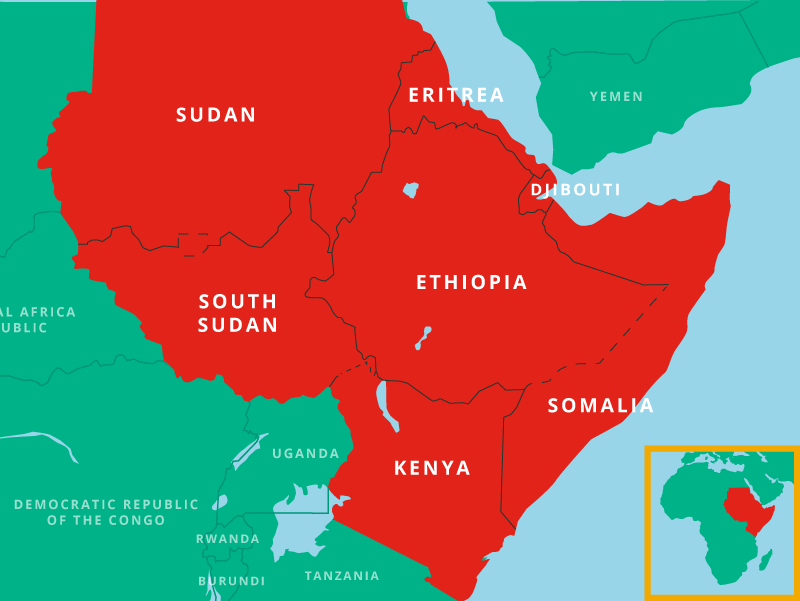
June 24th, 2024
It was always clear that Ethiopia’s false historical narrative would one day catch up with it. The country that was Abyssinia and adopted Africa’s historical Greek name of Ethiopia in 1932 currently proves every sunrise and every sunset that it cannot hold the many nations that were held together by force in the past. The war with Tigray, the current ongoing Amhara war and the much older Somali but currently sleeping Somali war and the many other nationalities that are stirring and seeking freedom from oppression, are all indications that things are no longer at ease or that things are falling apart to use the phrases of Chinua Achebe, Nigeria’s great author and literary man.
The center can no longer hold as fires flare up in almost every corner of the country. The Afar/Somali wars, the Benishangul uprising, the conflicts pitting the Amhara against the Tigrayans and vice versa, the involvement of Eritrean forces in West Ethiopia and the latest misstep of Ethiopia’s leader to sign an MoU with one of the regions of Somalia in an attempt to export the internal conflicts to neighboring countries, are all signs that Ethiopia needs to pause and take a deep breath. What has happened to the great nation that previous regimes maintained was forged out of internally generated ancient historical development?
Some call the misstep of the MoU an audacious move on the part of Ethiopia’s current leadership, but, indeed, one can only describe it as ill-thought of, undiplomatic, and reckless action that has put the ancient empire at risk. It has, indeed, aligned itself, almost childishly, with forces that probably wanted to see the end of Ethiopia and its breakup into its constituent nation states that were held together by force in the past. Note the country consists of 80 nations, some of which are large enough to stand alone as states, such as the Somali State, the Sidama State, the Oromia State, the Amhara State, the Tigray State and the Afar State and many others.
Emperor Haile Selassie would probably have come out of the grave forcefully should he have been informed of what is happening to the nation he forged through many means and ways – both legal and illegal, through diplomacy and skills that many Africans fail to achieve to this date.
Somalia’s claims on Ethiopia’s current territory, the Somali State of Ethiopia and which included parts of current Oromia State, was refuted by the international community and the African continent. What makes the current Ethiopian regime to believe that it can get away with the illegal MoU that challenges all established norms of territorial integrity and sovereignty of countries? How does the Ethiopia regime, which is unable to hold its nations together and is involved in absolutely uncalled for killing process of its own populations – the Amhara, the Tigrayan, the Benishangul, the Afar and the Somali, and many others, so myopic as not to note that this can only lead to further disruption of life in the Horn of Africa States region?
The flagrant interference in the affairs of neighbors can only lead to further turmoil in the region, and indeed, challenges the very essence of the Somali people, who are not known to shy away from protecting their rights, lands, seas and, indeed, lives. The undiplomatic faux pas of the current Ethiopia regime with respect to the MoU only exasperates the ongoing civil conflicts in Ethiopia and does not add one iota of advantage for Ethiopia. A much better defence of Ethiopia would have been the befriending and collaboration with Somalia, which traditionally was the source of most troubles of the country. It is where the Ethiopian diplomacy should have been directed.
It only brought Somalia to announce recently that Ethiopian forces, which are part of Africa’s ATMIS mission in Somalia would not be allowed to remain in the country by the end of this year. Instead of listening to the drift, Ethiopia seems to be ignoring the wishes of the Somali people and has recently poured more forces into the country. This appears to be aimed at recreating the old Ethio-Somali antagonisms, which was nearly forgotten by the populations.
This is not in the interest of the region and the Ethiopian regime’s brinkmanship appears to be only exasperating the region’s already beleaguered political instability and weaknesses and opens more spaces for foreigners to interfere in the region. The Ethiopian regime seems to be slavishly following the wrong guidance of mauvais conseillers, which would only lead to more chaos in Ethiopia and the region.
The future of the region and its fragile peace needs to be supported through dialogue, discussions and cooperation, not only within the realm of each state but also collectively as a region. The old nation-state format of the region only led to miseries and more chaos and it is perhaps high time the region’s leadership moved away from those unnecessary and risky processes which only lead to more internal and regional upheavals.
The grave miscalculations of the current Ethiopia regime with respect to Somalia would have terrible consequences for the region, which many enemies of the region would love to see happen or realized. The Ethiopian regime should refrain from the wrong trail it has embarked on and take a step back from the ill-thought of steps it has so far taken, which has put the region on the edge of a steep precipice. A regional dialogue would probably slow down the downward slip, the moves of Ethiopia has caused. It is the only way to a peaceful co-existence in the region and a better hope for its populations.



Dear Dr. Suleiman:-
Your opening paragraph ” It was always clear that Ethiopia’s false historical narrative would one day catch up with it. The country that was Abyssinia and adopted Africa’s historical Greek name of Ethiopia in 1932 currently proves every sunrise and every sunset that it cannot hold the many nations that were held together by force in the past. The war with Tigray, the current ongoing Amhara war and the much older Somali but currently sleeping Somali war and the many other nationalities that are stirring and seeking freedom from oppression, are all indications that things are no longer at ease or that things are falling apart …. ” demonstrates sheer ignorance from a person that claims to have a Doctorate. Did you buy it ?
As for Menilik’s use of force to restore Ethiopia, you need to read about Abraham Lincoln, Bismarck of Germany, Camillo di Cavour of Italy, Peter the Great of Russia , and many other great leaders about methods they had to use to build today’s great nations. Why do you expect Ethiopia’s Menilik to do it differently, possibly by organizing a grand garden party?
Ethiopia will never fall apart, and being completely ignorant of our rich history and heritage, I do not blame a layman for attributing 1932 as the date of birth of biblical Ethiopia. As for our small internal problems, rest assured that if an external aggressor were to come forward today, Amharas will be in the forefront and all other Ethiopians will join hands, as usual, to give it another historical lesson of the type given to the Italian invasion at Adwa by Emperor Menilik II, only 6 years after being Emperor of Ethiopia. Your wishes to see us split into mini-states will fail since the unity of Ethiopia and its being the home of a strong Africa will continue to prevail. Our current problems are too insignificant to answer the prayers of our historical enemies.
Ayayay! I prefer not to believe that this article was written by the same brother who graced us with with his plausible articles before. I’m flabbergasted here.